【C++登堂入室】类和对象(中)——类的6个默认成员函数
鲨鱼吃橘子 2024-09-20 15:05:03 阅读 89
目录
一、类的6个默认成员函数
编辑二、构造函数
2.1 概念
2.2 特性
三、析构函数
3.1 概念
3.2 特性
四、拷贝构造函数
4.1 概念
4.2 特征
五、赋值运算符重载
5.1 运算符重载
5.2 赋值运算符重载
5.3 前置++和后置++重载
六、日期类的实现
七、const成员
八、取地址及const取地址操作符重载
九、结尾
一、类的6个默认成员函数
如果一个类中什么成员都没有,简称为空类。
空类中真的什么都没有吗?并不是,任何类在什么都不写时,编译器会自动生成以下6个默认成员 函数。
默认成员函数:用户没有显式实现,编译器会生成的成员函数称为默认成员函数。
class Data { };

二、构造函数
2.1 概念
对于以下Date(日期)类:
<code>class Date
{
public:
void Init(int year, int month, int day)
{
_year = year;
_month = month;
_day = day;
}
void Print()
{
cout << _year << "-" << _month << "-" << _day << endl;
}
private:
int _year;
int _month;
int _day;
};
int main()
{
Date d1;
d1.Init(2022, 7, 5);
d1.Print();
Date d2;
d2.Init(2022, 7, 6);
d2.Print();
return 0;
}
对于Date类,可以通过 Init 公有方法给对象设置日期,但如果每次创建对象时都调用该方法设置 信息,未免有点麻烦,那能否在对象创建时,就将信息设置进去呢?
构造函数是一个特殊的成员函数,名字与类名相同,创建类类型对象时由编译器自动调用,以保证 每个数据成员都有 一个合适的初始值,并且在对象整个生命周期内只调用一次。
2.2 特性
构造函数是特殊的成员函数,需要注意的是,构造函数虽然名称叫构造,但是构造函数的主要任 务并不是开空间创建对象,而是初始化对象。
其特征如下:
1. 函数名与类名相同。
2. 无返回值。
3. 对象实例化时编译器自动调用对应的构造函数。
4. 构造函数可以重载。
class Date
{
public:
// 1.无参构造函数
Date()
{}
// 2.带参构造函数
Date(int year, int month, int day)
{
_year = year;
_month = month;
_day = day;
}
private:
int _year;
int _month;
int _day;
};
void TestDate()
{
Date d1; // 调用无参构造函数
//Date d1();//编译错误,如果通过无参构造函数创建对象时,对象后面不用跟括号,否则就成了函数声明
// warning C4930: “Date d3(void)”: 未调用原型函数(是否是有意用变量定义的?)
Date d2(2015, 1, 1); // 调用带参的构造函数
}
5. 如果类中没有显式定义构造函数,则C++编译器会自动生成一个无参的默认构造函数,一旦用户显式定义编译器将不再生成。
class Date
{
public:
/*
// 如果用户显式定义了构造函数,编译器将不再生成
Date(int year, int month, int day)
{
_year = year;
_month = month;
_day = day;
}
*/
void Print()
{
cout << _year << "-" << _month << "-" << _day << endl;
}
private:
int _year;
int _month;
int _day;
};
int main()
{
// 将Date类中构造函数屏蔽后,代码可以通过编译,因为编译器生成了一个无参的默认构造函数
// 将Date类中构造函数放开,代码编译失败,因为一旦显式定义任何构造函数,编译器将不再生成
// 无参构造函数,放开后报错:error C2512: “Date”: 没有合适的默认构造函数可用
Date d1;
return 0;
}
注意:不写构造函数编译器会自动生成,取决于编译器,有些编译器给随机值,有些编译器初始化为0.
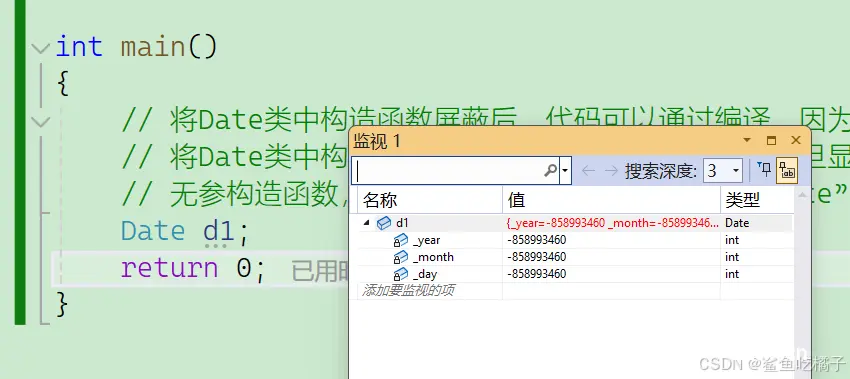
6. 关于编译器生成的默认成员函数,很多童鞋会有疑惑:不实现构造函数的情况下,编译器会 生成默认的构造函数。但是看起来默认构造函数又没什么用?d对象调用了编译器生成的默 认构造函数,但是d对象_year/_month/_day,依旧是随机值。也就说在这里编译器生成的默认构造函数并没有什么用??
解答:C++把类型分成内置类型(基本类型)和自定义类型。内置类型就是语言提供的数据类型,如:int/char...,自定义类型就是我们使用class/struct/union等自己定义的类型,看看下面的程序,就会发现编译器生成默认的构造函数会对自定类型成员_t调用的它的默认成员函数。
<code>class Time
{
public:
Time()
{
cout << "Time()" << endl;
_hour = 0;
_minute = 0;
_second = 0;
}
private:
int _hour;
int _minute;
int _second;
};
class Date
{
private:
// 基本类型(内置类型)
int _year = 1970;
int _month = 1;
int _day = 1;
// 自定义类型
Time _t;
};
int main()
{
Date d;
return 0;
}
注意:对于我们没写构造函数,编译器会:
1.内置类型成员不做处理。
a.有些编译器会处理。
b.C++11打了补丁,声明可以给缺省值给了会用缺省值初始化。
2.自定义类型成员,会去调用他的默认构造。
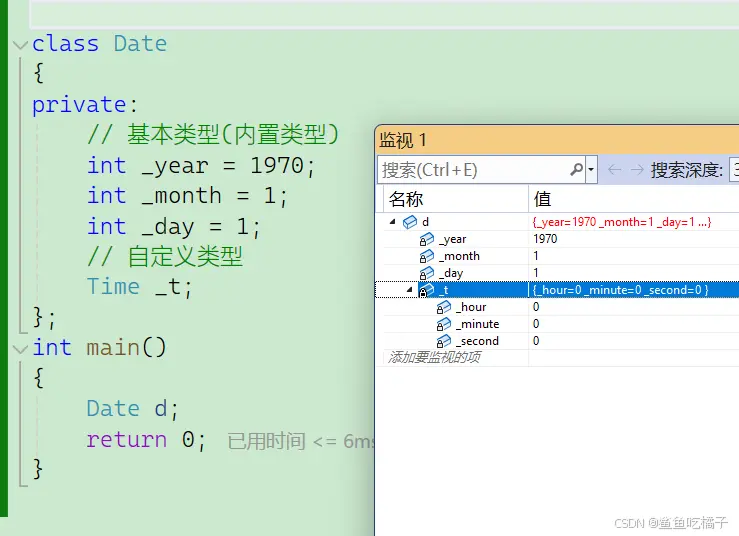
7. 无参的构造函数和全缺省的构造函数都称为默认构造函数,并且默认构造函数只能有一个。
注意:无参构造函数、全缺省构造函数、我们没写编译器默认生成的构造函数,都可以认为 是默认构造函数。
代码中有注释理解
<code>class Date
{
public:
Date()
{
_year = 1949;
_month = 10;
_day = 1;
}
Date(int year = 1945, int month = 8, int day =15)
{
_year = year;
_month = month;
_day = day;
}
private:
int _year;
int _month;
int _day;
};
// 以下测试函数能通过编译吗?
int main()
{
//Date d1; //编译出错,无参构造函数和全缺省构造函数同为默认构造函数
//编译器不知道调用哪一个
Date d2();//编译出错,会跟函数声明冲突,编译器不好识别
Date d2(1949, 10, 1); // 自动调用带参构造函数
return 0;
}
三、析构函数
3.1 概念
通过前面构造函数的学习,我们知道一个对象是怎么来的,那一个对象又是怎么没呢的? 析构函数:与构造函数功能相反,析构函数不是完成对对象本身的销毁,局部对象销毁工作是由 编译器完成的。而对象在销毁时会自动调用析构函数,完成对象中资源的清理工作。
3.2 特性
析构函数是特殊的成员函数,其特征如下:
1. 析构函数名是在类名前加上字符 ~。
2. 无参数无返回值类型。
3. 一个类只能有一个析构函数。若未显式定义,系统会自动生成默认的析构函数。
注意:析构函数不能重载
4. 对象生命周期结束时,C++编译系统系统自动调用析构函数。
typedef int DataType;
class Stack
{
public:
Stack(size_t capacity = 3)
{
_array = (DataType*)malloc(sizeof(DataType) * capacity);
if (NULL == _array)
{
perror("malloc申请空间失败!!!");
return;
}
_capacity = capacity;
_size = 0;
}
void Push(DataType data)
{
// CheckCapacity();
_array[_size] = data;
_size++;
}
// 其他方法...
~Stack()
{
cout << "~Stack" << endl;
if (_array)
{
free(_array);
_array = NULL;
_capacity = 0;
_size = 0;
}
}
private:
DataType* _array;
int _capacity;
int _size;
};
int main()
{
Stack s;
return 0;
}
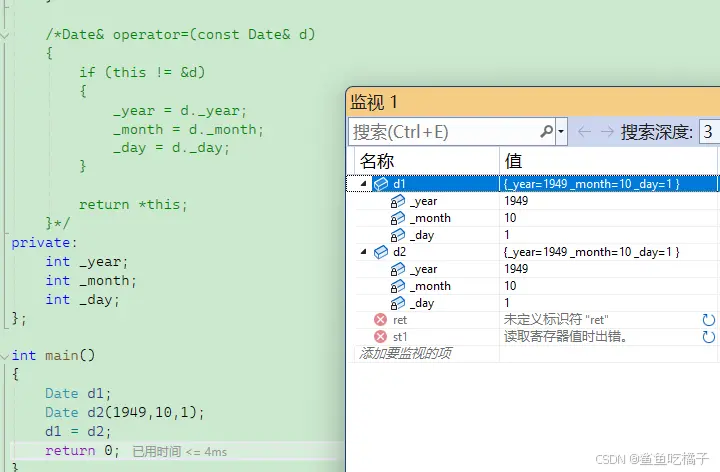
注意:析构函数和构造函数一样都不需要我们自己去调用,编译器会自动调用。
5. 关于编译器自动生成的析构函数,是否会完成一些事情呢?下面的程序我们会看到,编译器 生成的默认析构函数,对自定类型成员调用它的析构函数。
<code>class Time
{
public:
~Time()
{
cout << "~Time()" << endl;
}
private:
int _hour;
int _minute;
int _second;
};
class Date
{
private:
// 基本类型(内置类型)
int _year = 1970;
int _month = 1;
int _day = 1;
// 自定义类型
Time _t;
};
int main()
{
Date d;
return 0;
}
// 程序运行结束后输出:~Time()
// 在main方法中根本没有直接创建Time类的对象,为什么最后会调用Time类的析构函数?
// 因为:main方法中创建了Date对象d,而d中包含4个成员变量,其中_year, _month, _day三个是 // 内置类型成员,销毁时不需要资源清理,最后系统直接将其内存回收即可;而_t是Time类对 象,所以在d销毁时,要将其内部包含的Time类的_t对象销毁,所以要调用Time类的析构函数。但是: main函数
// 中不能直接调用Time类的析构函数,实际要释放的是Date类对象,所以编译器会调用Date 类的析构函 // 数,而Date没有显式提供,则编译器会给Date类生成一个默认的析构函数,目的是在其内部 调用Time // 类的析构函数,即当Date对象销毁时,要保证其内部每个自定义对象都可以正确销毁 // main函数中并没有直接调用Time类析构函数,而是显式调用编译器为Date类生成的默认析 构函数 // 注意:创建哪个类的对象则调用该类的析构函数,销毁那个类的对象则调用该类的析构函数
6. 如果类中没有申请资源时,析构函数可以不写,直接使用编译器生成的默认析构函数,比如 Date类;有资源申请时,一定要写,否则会造成资源泄漏,比如Stack类。
注意:系统会默认生成的析构函数。
1.内置类型成员不做处理。
2.自定义类型成员会去调用他的析构函数。
建议:1.一般情况下,有动态申请资源,就需要显示写析构函数释放资源。
2.没有动态申请的资源,不需要写析构。
3.需要释放资源的成员都是自定义类型,不需要写析构。
四、拷贝构造函数
4.1 概念
在现实生活中,可能存在一个与你一样的自己,我们称其为双胞胎。
那在创建对象时,可否创建一个与已存在对象一某一样的新对象呢?
拷贝构造函数:只有单个形参,该形参是对本类类型对象的引用(一般常用const修饰),在用已存 在的类类型对象创建新对象时由编译器自动调用。
4.2 特征
拷贝构造函数也是特殊的成员函数,其特征如下:
拷贝构造函数是构造函数的一个重载形式。 拷贝构造函数的参数只有一个且必须是类类型对象的引用,使用传值方式编译器直接报错, 因为会引发无穷递归调用。
class Date
{
public:
Date(int year = 1949, int month = 10, int day = 1)
{
_year = year;
_month = month;
_day = day;
}
//Date(const Date d) // 错误写法:编译报错,会引发无穷递归
Date(const Date& d) // 正确写法
{
_year = d._year;
_month = d._month;
_day = d._day;
}
private:
int _year;
int _month;
int _day;
};
int main()
{
Date d1;
Date d2(d1);
return 0;
}

3. 若未显式定义,编译器会生成默认的拷贝构造函数。 默认的拷贝构造函数对象按内存存储按字节序完成拷贝,这种拷贝叫做浅拷贝,或者值拷贝。
<code>class Time
{
public:
Time()
{
_hour = 1;
_minute = 1;
_second = 1;
}
Time(const Time& t)
{
_hour = t._hour;
_minute = t._minute;
_second = t._second;
cout << "Time::Time(const Time&)" << endl;
}
private:
int _hour;
int _minute;
int _second;
};
class Date
{
private:
// 基本类型(内置类型)
int _year = 1970;
int _month = 1;
int _day = 1;
// 自定义类型
Time _t;
};
int main()
{
Date d1;
// 用已经存在的d1拷贝构造d2,此处会调用Date类的拷贝构造函数
// 但Date类并没有显式定义拷贝构造函数,则编译器会给Date类生成一个默认的拷贝构造函数
Date d2(d1);
return 0;
}
当我们把自己写的拷贝构造函数注释掉后,编译器会自动调用其默认的拷贝构造函数
注释掉之后自己写的拷贝构造之后,编译器完成的默认拷贝构造。

注意:在编译器生成的默认拷贝构造函数中,内置类型是按照字节方式直接拷贝的,而自定 义类型是调用其拷贝构造函数完成拷贝的。
4. 编译器生成的默认拷贝构造函数已经可以完成字节序的值拷贝了,还需要自己显式实现吗? 当然像日期类这样的类是没必要的。那么下面的类呢?验证一下试试?
class Stack
{
public:
Stack(size_t capacity = 10)
{
_array = (DataType*)malloc(capacity * sizeof(DataType));
if (nullptr == _array)
{
perror("malloc申请空间失败");
return;
}
_size = 0;
_capacity = capacity;
}
void Push(const DataType& data)
{
// CheckCapacity();
_array[_size] = data;
_size++;
}
~Stack()
{
if (_array)
{
free(_array);
_array = nullptr;
_capacity = 0;
_size = 0;
}
}
private:
DataType* _array;
size_t _size;
size_t _capacity;
};
int main()
{
Stack s1;
s1.Push(1);
s1.Push(2);
s1.Push(3);
s1.Push(4);
Stack s2(s1);
return 0;
}
程序崩溃:
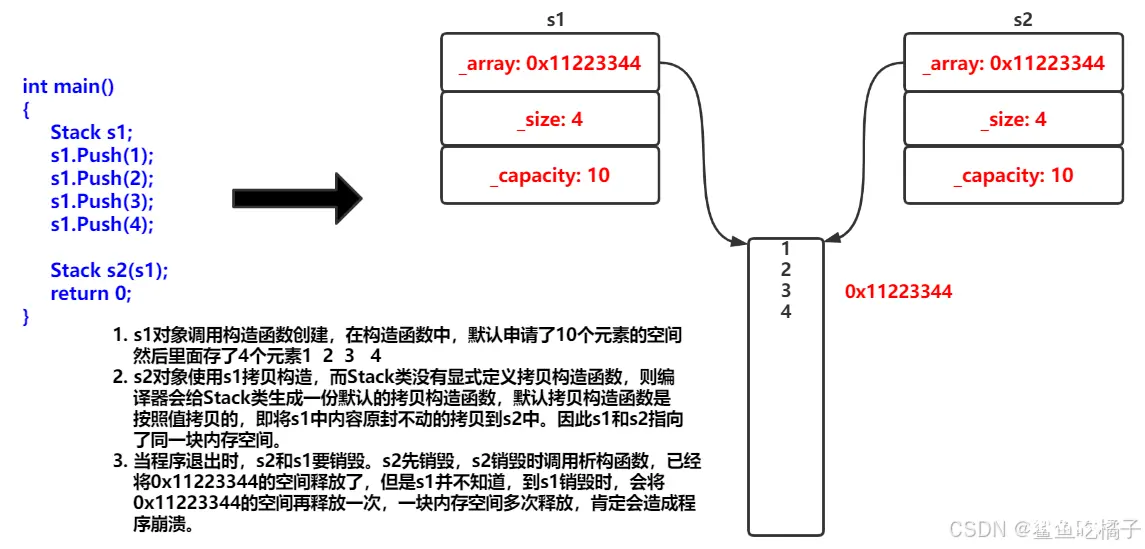
注意:类中如果没有涉及资源申请时,拷贝构造函数是否写都可以;一旦涉及到资源申请 时,则拷贝构造函数是一定要写的,否则就是浅拷贝。
5. 拷贝构造函数典型调用场景:
使用已存在对象创建新对象函数参数类型为类类型对象函数返回值类型为类类型对象
<code>class Date
{
public:
Date(int year, int month, int day)
{
cout << "Date(int,int,int):" << this << endl;
}
Date(const Date& d)
{
cout << "Date(const Date& d):" << this << endl;
}
~Date()
{
cout << "~Date():" << this << endl;
}
private:
int _year;
int _month;
int _day;
};
Date& Test(Date d)//引用返回temp已经被释放,返回的是被释放的空间temp
{
Date temp(d);
return temp;
}
Date Test(Date d)
{
Date temp(d);
return temp;
}
int main()
{
Date d1(2023, 8, 8);
Test(d1);
return 0;
}

为了提高程序效率,一般对象传参时,尽量使用引用类型,返回时根据实际场景,能用引用 尽量使用引用。
五、赋值运算符重载
5.1 运算符重载
C++为了增强代码的可读性引入了运算符重载,运算符重载是具有特殊函数名的函数,也具有其 返回值类型,函数名字以及参数列表,其返回值类型与参数列表与普通的函数类似。
函数名字为:关键字operator后面接需要重载的运算符符号。
函数原型:返回值类型 operator操作符(参数列表)
注意:
不能通过连接其他符号来创建新的操作符:比如operator@重载操作符必须有一个类类型参数用于内置类型的运算符,其含义不能改变,例如:内置的整型+,不 能改变其含义作为类成员函数重载时,其形参看起来比操作数数目少1,因为成员函数的第一个参数为隐 藏的this.* :: sizeof ?: . 注意以上5个运算符不能重载。这个经常在笔试选择题中出现。
5.2 赋值运算符重载
1. 赋值运算符重载格式 参数类型:
const T&,传递引用可以提高传参效率返回值类型:T&,返回引用可以提高返回的效率,有返回值目的是为了支持连续赋值检测是否自己给自己赋值返回*this :要复合连续赋值的含义
<code>class Date
{
public:
Date(int year = 1900, int month = 1, int day = 1)
{
_year = year;
_month = month;
_day = day;
}
Date(const Date& d)
{
_year = d._year;
_month = d._month;
_day = d._day;
}
Date& operator=(const Date& d)
{
if (this != &d)
{
_year = d._year;
_month = d._month;
_day = d._day;
}
return *this;
}
private:
int _year;
int _month;
int _day;
};
注意:即使我们自己也没有写赋值运算符重载函数,编译器也会自己默认生成赋值运算符重载,如下图,注释掉自己写的之后,编译器自己默认生成的赋值运算符重载我们也能够使用,当然编译器默认生成的属于浅拷贝,所以我们需谨慎使用。

2. 赋值运算符只能重载成类的成员函数不能重载成全局函数
由前面可知我们不写赋值重载的成员函数,编译器会自动生成,当我们在全局定义赋值运算重载的时候与编译器默认生成的赋值重载函数发生冲突,编译器不好识别,所以编译出错。
<code>class Date
{
public:
Date(int year = 1900, int month = 1, int day = 1)
{
_year = year;
_month = month;
_day = day;
}
int _year;
int _month;
int _day;
};
// 赋值运算符重载成全局函数,注意重载成全局函数时没有this指针了,需要给两个参数
Date& operator=(Date& left, const Date& right)
{
if (&left != &right)
{
left._year = right._year;
left._month = right._month;
left._day = right._day;
}
return left;
}
// 编译失败:
// error C2801: “operator =”必须是非静态成员
原因:赋值运算符如果不显式实现,编译器会生成一个默认的。此时用户再在类外自己实现 一个全局的赋值运算符重载,就和编译器在类中生成的默认赋值运算符重载冲突了,故赋值 运算符重载只能是类的成员函数。
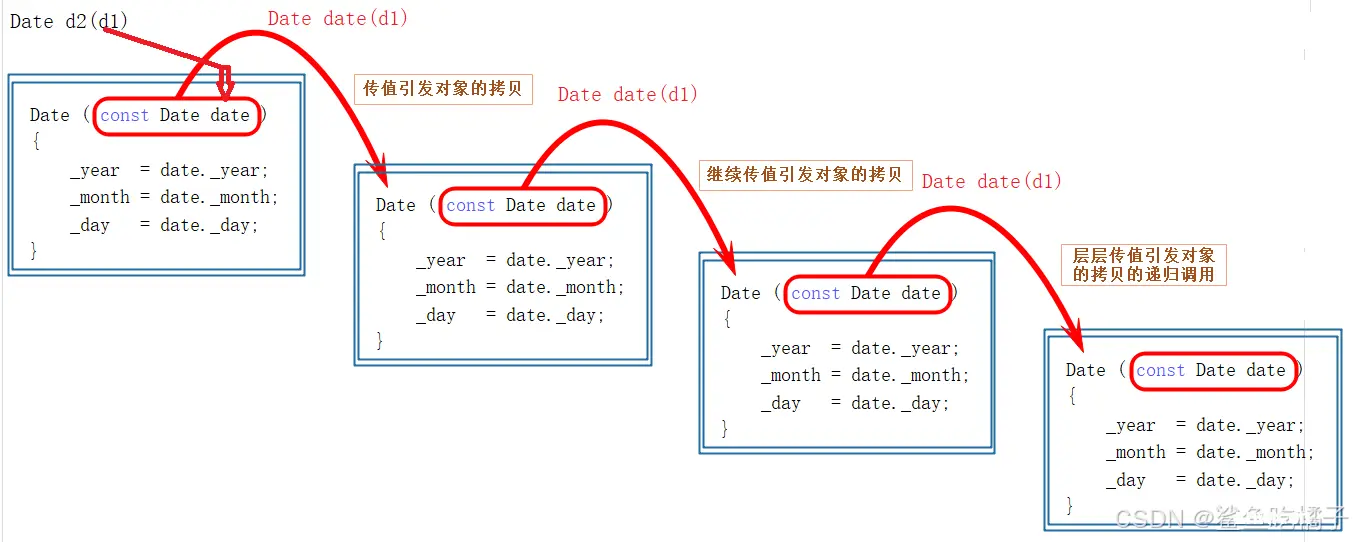
3. 用户没有显式实现时,编译器会生成一个默认赋值运算符重载,以值的方式逐字节拷贝。注 意:内置类型成员变量是直接赋值的,而自定义类型成员变量需要调用对应类的赋值运算符 重载完成赋值。
<code>class Time
{
public:
Time()
{
_hour = 1;
_minute = 1;
_second = 1;
}
Time& operator=(const Time& t)
{
if (this != &t)
{
_hour = t._hour;
_minute = t._minute;
_second = t._second;
}
return *this;
}
private:
int _hour;
int _minute;
int _second;
};
class Date
{
private:
// 基本类型(内置类型)
int _year = 1970;
int _month = 1;
int _day = 1;
// 自定义类型
Time _t;
};
int main()
{
Date d1;
Date d2;
d1 = d2;
return 0;
}
既然编译器生成的默认赋值运算符重载函数已经可以完成字节序的值拷贝了,还需要自己实 现吗?当然像日期类这样的类是没必要的。那么下面的类呢?验证一下试试?
// 这里会发现下面的程序会崩溃掉?这里就需要我们以后讲的深拷贝去解决。
typedef int DataType;
class Stack
{
public:
Stack(size_t capacity = 10)
{
_array = (DataType*)malloc(capacity * sizeof(DataType));
if (nullptr == _array)
{
perror("malloc申请空间失败");
return;
}
_size = 0;
_capacity = capacity;
}
void Push(const DataType& data)
{
// CheckCapacity();
_array[_size] = data;
_size++;
}
~Stack()
{
if (_array)
{
free(_array);
_array = nullptr;
_capacity = 0;
_size = 0;
}
}
private:
DataType* _array;
size_t _size;
size_t _capacity;
};
int main()
{
Stack s1;
s1.Push(1);
s1.Push(2);
s1.Push(3);
s1.Push(4);
Stack s2;
s2 = s1;
return 0;
}
注意:如果类中未涉及到资源管理,赋值运算符是否实现都可以;一旦涉及到资源管理则必 须要实现。
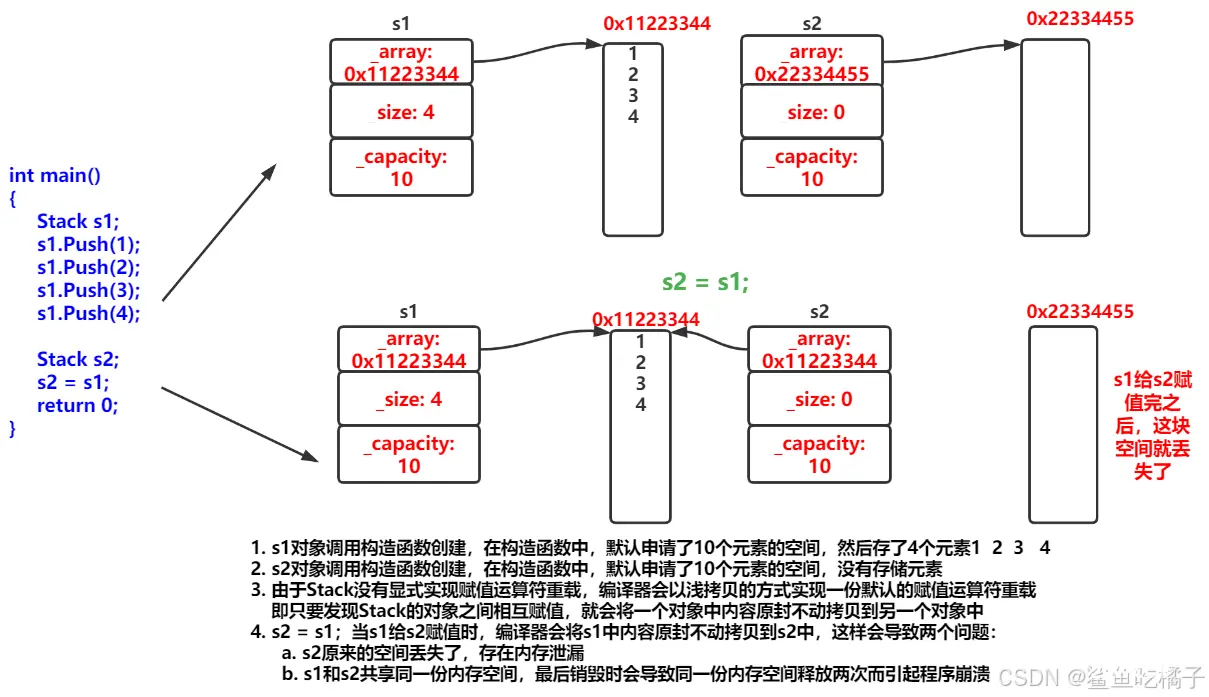
5.3 前置++和后置++重载
<code>class Date
{
public:
Date(int year = 1900, int month = 1, int day = 1)
{
_year = year;
_month = month;
_day = day;
}
// 前置++:返回+1之后的结果
// 注意:this指向的对象函数结束后不会销毁,故以引用方式返回提高效率
Date& operator++()
{
_day += 1;
return *this;
}
// 后置++:
// 前置++和后置++都是一元运算符,为了让前置++与后置++形成能正确重载
// C++规定:后置++重载时多增加一个int类型的参数,但调用函数时该参数不用传递,编译器
//自动传递
// 注意:后置++是先使用后+1,因此需要返回+1之前的旧值,故需在实现时需要先将this保存
一份,然后给this + 1
// 而temp是临时对象,因此只能以值的方式返回,不能返回引用
Date operator++(int)
{
Date temp(*this);
_day += 1;
return temp;
}
private:
int _year;
int _month;
int _day;
};
int main()
{
Date d;
Date d1(2022, 1, 13);
d = d1++; // d: 2022,1,13 d1:2022,1,14
d = ++d1; // d: 2022,1,15 d1:2022,1,15
return 0;
}
六、日期类的实现
代码可能很长,但是这是前面所讲内容的总结,如果能够自主不看代码,自主完成日期类代码的实现而且能够理解代码,说明你对前面的内容已经掌握了
//日期内的实现
class Date
{
public:
// 全缺省的构造函数
Date(int year=1, int month=1, int day=1);
// 拷贝构造函数
Date(const Date& d)
{
_year = d._year;
_month = d._month;
_day = d._day;
}
//获取每个月的天数
int Geymonthday(int year, int month);
// 赋值运算符重载
Date& operator=(const Date& d);
//运算符重载<
bool operator<(const Date& x) const;
//运算符重载==
bool operator==(const Date& x) const;
//运算符重载<=
bool operator<=(const Date& x) const;
//运算符重载>
bool operator>(const Date& x) const;
//运算符重载>=
bool operator>=(const Date& x) const;
//运算符重载!=
bool operator!=(const Date& x) const;
//日期加天数 例:d1=d1+100;改变d1的值
Date& operator+=(int day);
//日期加天数 例:d1+100;不改变d1的值
Date operator+(int day) const;
//日期减天数 例:d1=d1-100;改变d1的值
Date& operator-=(int day);
//日期加天数 例:d1-100;不改变d1的值
Date operator-(int day) const;
//前置++
Date& operator++();
//后置++
Date operator++(int);
//前置--
Date& operator--();
//后置--
Date operator--(int);
//两个日期相减返回天数值
int operator-(const Date& d) const;
private:
int _year;
int _month;
int _day;
};
//获取每个月的天数
int Date::Geymonthday(int year, int month)
{
int dayarr[13] = { 0,31,28,31,30,31,30,31,31,30,31,30,31 };
if (month == 2 && ((year % 4 == 0 && year % 100 != 0) || year % 400 == 0))
{
return 29;
}
else
{
return dayarr[month];
}
}
// 全缺省的构造函数
Date::Date(int year, int month, int day)
{
if (month > 0 && month < 13)
{
_year = year;
_month = month;
_day = day;
}
else
{
cout << "输入非法" << endl;
assert("false");
}
}
// 赋值运算符重载
Date& Date::operator=(const Date& d)
{
if (this != &d)
{
_year = d._year;
_month = d._month;
_day = d._day;
}
return *this;
}
//运算符重载<
bool Date::operator<(const Date& x) const
{
if (this->_year < x._year)
{
return true;
}
if (this->_year == x._year && this->_month < x._month)
{
return true;
}
if (this->_year == x._year && this->_month == x._month && this->_day < x._day)
{
return true;
}
return false;
}
//运算符重载==
bool Date::operator==(const Date& x) const
{
return this->_year == x._year &&
this->_month == x._month && this->_day == x._day;
}
//运算符重载<=
bool Date::operator<=(const Date& x) const
{
//return operator==(x)||operator<(x);两者都可以
return *this == x || *this < x;
}
//运算符重载>
bool Date::operator>(const Date& x) const
{
return !(*this <= x);
}
//运算符重载>=
bool Date::operator>=(const Date& x) const
{
return !(*this < x);
}
//运算符重载!=
bool Date::operator!=(const Date& x) const
{
return !(*this == x);
}
//日期加天数
Date& Date::operator+=(int day)
{
_day += day;
while (_day>0 && _day > Date::Geymonthday(_year,_month))
{
_month++;
if (_month > 12)
{
_month = 1;
_year++;
}
_day -= Date::Geymonthday(_year, _month);
}
return *this;
}
//日期加天数 例:d1+100;不改变d1的值
Date Date::operator+(int day) const
{
Date tmp(*this);
tmp += 100;
return tmp;
}
//日期减天数 例:d1=d1-100;改变d1的值
Date& Date::operator-=(int day)
{
/*int tmp = _day;
_day = day;
_month -= 1;
while (_day > Date::Geymonthday(_year, _month))
{
_day -= Date::Geymonthday(_year, _month);
_month--;
if (_month < 1)
{
_year--;
_month == 12;
}
}
_day = Date::Geymonthday(_year, _month) - _day;
*this += tmp;*/
_day -= day;
while (_day <= 0)
{
--_month;
if (_month == 0)
{
_month = 12;
--_year;
}
_day += Geymonthday(_year, _month);
}
return *this;
}
//日期加天数 例:d1-100;不改变d1的值
Date Date::operator-(int day) const
{
Date tmp = *this;
tmp -= day;
return tmp;
}
//前置++
Date& Date::operator++()
{
*this += 1;
return *this;
}
// 后置++
// 增加这个int参数不是为了接收具体的值,仅仅是占位,跟前置++构成重载
Date Date::operator++(int)
{
Date tmp = *this;
*this += 1;
return tmp;
}
//前置--
Date& Date::operator--()
{
*this -= 1;
return *this;
}
//后置--
Date Date::operator--(int)
{
Date tmp = *this;
*this -= 1;
return tmp;
}
//两个日期相减返回天数值
int Date::operator-(const Date& d) const
{
Date max = *this;
Date min = d;
int flag = 1;
if (*this < d)
{
max = d;
min = *this;
flag = -1;
}
int n = 0;
while (min != max)
{
++min;
++n;
}
return n * flag;
}
七、const成员
将const修饰的“成员函数”称之为const成员函数,const修饰类成员函数,实际修饰该成员函数隐含的this指针,表明在该成员函数中不能对类的任何成员进行修改。

八、取地址及const取地址操作符重载
这两个默认成员函数一般不用重新定义 ,编译器默认会生成。
<code>class Date
{
public:
Date* operator&()
{
return this;
}
const Date* operator&()const
{
return this;
}
private:
int _year; // 年
int _month; // 月
int _day; // 日
};
这两个运算符一般不需要重载,使用编译器生成的默认取地址的重载即可,只有特殊情况,才需 要重载,比如想让别人获取到指定的内容!
九、结尾
如果有什么建议和疑问,或是有什么错误,希望大家可以在评论区提一下。
希望大家以后也能和我一起进步!!
如果这篇文章对你有用的话,请大家给一个三连支持一下!!
谢谢大家收看🌹🌹
声明
本文内容仅代表作者观点,或转载于其他网站,本站不以此文作为商业用途
如有涉及侵权,请联系本站进行删除
转载本站原创文章,请注明来源及作者。